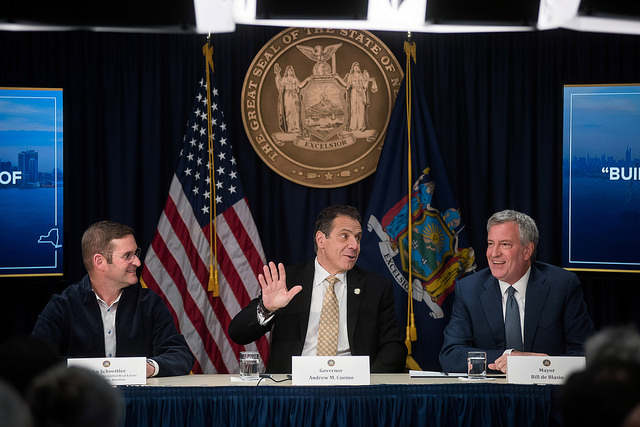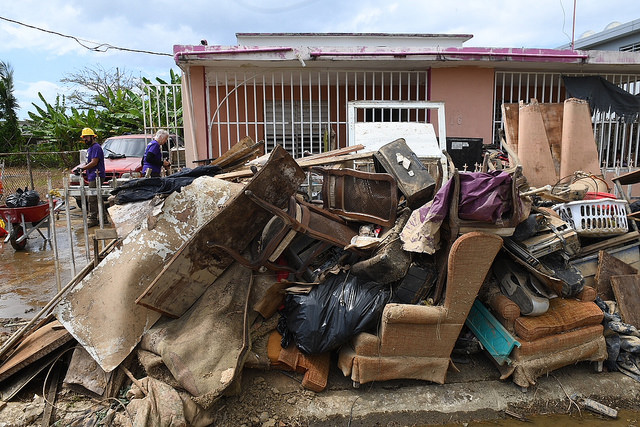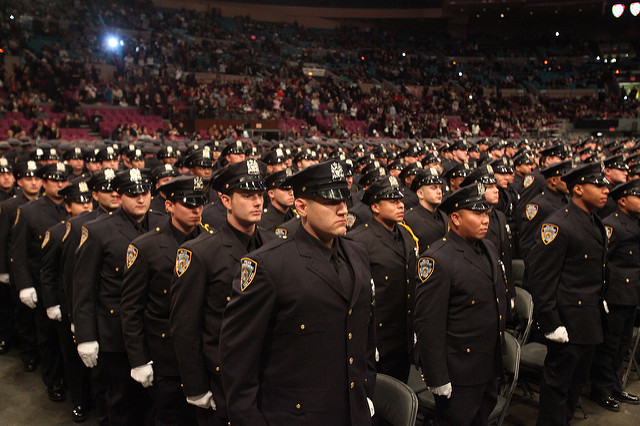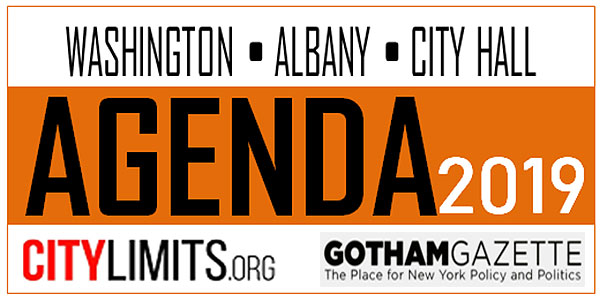Amazonian Lessons for Urbanists

Gov. Cuomo & Mayor de Blasio announcing Amazon deal (photo: Ed Reed/Mayor's Office)
As soon as Amazon announced last year that it would be opening a second headquarters to house 50,000 new employees, cities across the country feverishly competed to lure the colossus retailer. With promises of tax breaks, infrastructure upgrades, employee training and just anything they thought would work, local politicians courted billionaire entrepreneur Jeff Bezos hoping he would deem their town worthy of his high tech presence. The bragging rights alone seemed well worth the price.
In New York, Governor Andrew Cuomo and Mayor Bill de Blasio overcame long animosities as they ran victory laps around Long Island City to celebrate winning even half the prize.
To Cuomo and de Blasio’s surprise, not everyone is so elated.
Local legislators howled when they heard that the state would circumvent the city’s land use process and deny community residents a more full opportunity to review and comment on the development. Queens residents raised concerns that Amazon’s arrival would accentuate ongoing problems of displacement and gentrification. A skeptical New York press parsed through whatever information was available to figure out what the state and city were giving away to close the deal. The very smart people who write editorials for the New York Times concluded it wasn’t New York bagels that attracted Amazon to Queens.
The entire episode can be instructive for those who care about the future of cities and the people who live in them. There is plenty of blame to go around, and it does not stop in New York. What follows is four major lessons to move the conversation along.
1. Nobody knows
It was bad enough that the entire deal was negotiated in secrecy. But even with more information available, it is difficult to definitively assess the costs and benefits of such complex arrangements with any measure of certainty.
Sometimes, we don’t discover the consequences until it is too late. Last week, a study completed by researchers at the New School’s Center for Economic and Policy Analysis estimated that Mayor Michael Bloomberg’s “self financing” Hudson Yards project will cost taxpayers $2.2 billion. In the Amazon case, most of the exceptional tax breaks are being absorbed by the state. The city has not negotiated away any special financial benefits beyond those contained in existing laws – except, of course, an opportunity for affected communities to have a real say in what happens where they live. The latter is a matter of state law.
New Yorkers, like most Americans, are cynical about the political process. When people don’t know all the facts in a complex situation like this one, they assume they are being short-changed. They usually are.
2. Politicians are tone deaf
The United States has the widest disparity in wealth and income of any major country in the free world. New York City is a worst-case example of how concentrated wealth is localized. Much of the growing disparity is a result of federal regulatory and tax policies that have functioned to make the rich richer and the poor poorer. Economists have been tracking this trend for decades.
Most Americans more or less understand what is happening and they are angry. They express their anger in the voting booth, but many politicians don’t seem to get the message. A relatively unknown candidate named Bernie Sanders almost derailed Hillary Clinton’s taken-for-granted Democratic Party nomination in 2016 when he candidly told voters that the political system is “rigged” against them. Donald Trump, unfortunately, capitalized on voter discontent to defeat Clinton in the general election.
Local politicians contribute to the overall distrust in government when they make sweetheart deals with corporations and real estate magnates. People, especially those struggling to make ends meet, don’t like to be had and they know it happens to them all the time.
3. Our political leaders live in a bubble
Didn’t decision-makers understand that handing over nearly $3 billion in incentives and grants to the richest man in the world so that he can make more money would stir resentment? Whose brilliant idea was it to allow CEO Jeff Bezos to build a private helipad just down the road from stops on a crumbling subway system and public housing projects where people are living under substandard conditions?
How can public officials defend the Amazon deal after telling us that we do not have the funds to address such problems? Put aside the merits of the case. What about the optics (which do matter)? Don’t our elected officials have public relations experts around them to explain that subsidizing a private landing pad for a billionaire entrepreneur is a ridiculous idea that does not sit well with ordinary people? Can’t Mr. Bezos figure out another way to get to the office?
4. Big is not beautiful
Where is Teddy Roosevelt when we need him? There was a time when leaders who called themselves progressives broke up large business conglomerates in the public interest. They understood that supersized economic enterprises can hinder healthy competition and that accumulated wealth can give certain individuals outsized influence in the democratic process. They had the gumption to take on the likes of John D. Rockefeller and his Standard Oil cartel. Populism was once a bipartisan progressive project. That was before professional lobbyists armed with campaign cash took over Washington.
Amazon is a prime example of how elected officials in both major parties have let businesses grow across commercial domains with little concern for the public interest. Jeff Bezos can sell you anything from a high-tech computer to a bag of grapes. When he decides to come to your town, he commands the attention of those in charge, and usually gets what he wants. Yes, including his personal landing pad.
***
Joseph P. Viteritti is the Thomas Hunter Professor of Public Policy at Hunter College and author of The Pragmatist: Bill de Blasio’s Quest to Save the Soul of New York (Oxford). Note: I need to thank the students in my “Governing the City” class for their stimulating conversation on this topic.
***
Have an op-ed idea or submission for Gotham Gazette? Email This email address is being protected from spambots. You need JavaScript enabled to view it.
The Invisible Toll of Hurricane Maria

Puerto Rico (photo via the governor's office)
The physical damage caused by Hurricane Maria on the island of Puerto Rico was undoubtedly devastating. Fortunately, homes and buildings can, have been, and will be rebuilt, but it’s often trauma from these natural disasters that leaves the most lasting and destructive mark on a community.
The psychological impact of months without electricity, access to food and clean water, and unexpectedly losing loved ones – experienced on an island-wide scale – cannot be overstated. This kind of stress and instability is shocking, and that’s why so many professionals in the mental health community have prioritized working with victims of Hurricane Katrina in New Orleans, Superstorm Sandy in the northeast, and other natural disasters over the years.
It's not unusual for storm victims to have feelings of fear, anxiety, sadness, or shock in the immediate aftermath of these destructive events. It becomes a problem when these feelings continue for weeks, months, or years after such disasters. Mental health professionals know that if communities are not given the proper help and support to cope with trauma from a horrific storm, they may never truly recover.
Earlier this month, political and community leaders from New York City gathered in Puerto Rico to assist with recovery, and work together to help chart a path forward. At the core of the discussion was mental health and health care – in fact, New York Mayor Bill de Blasio made it the signature announcement of his trip. He and First Lady Chirlane McCray announced a $200,000 commitment to help a nonprofit health care provider hire additional psychiatrists for some of the neediest communities – including one dedicated to children.
This help could not come soon enough. While on the island myself two weeks ago, I helped deliver supplies to a Federally Qualified Health Center, which is trying to do as much as it can with the little it has. Equipment as basic as medical gloves is frequently needed, and doctors are forced to meet with patients – some even struggling with drug and alcohol addiction as well – in rooms the size of large closets. All the while, quality primary and specialty care for these communities is needed more than ever before, with thousands of doctors fleeing the island in the years leading up to Maria and during its aftermath.
For too long, mental health has been an afterthought of medical care, especially in Latino communities. In a recent citywide study we conducted of New York’s Latino patients – Invisible: The State of Latino Health – we found that only one-third of Latinos think that behavioral or mental health services are easily accessible. This lack of access to care can have severe consequences, as untreated trauma can push the most vulnerable to substance abuse and addiction. The New York City Department of Health and Mental Hygiene reports that almost two-thirds of New York City Latinos who die from drug overdose are, in fact, Puerto Rican.
We know another Hurricane Maria will hit – it’s just a matter of when. Until then, we need governments, public leaders, and community groups to ensure Puerto Rico has the right support systems in place to help families rebuild their spirits and psyches, not just their homes. While the financial costs of these disasters may make the biggest headline splash, it’s the often unseen damage that may demand our greatest attention and action.
[Read: State of Latino Health: Dismal, and Invisible]
***
Ricardo is the Chief Business Development Office for SOMOS Community Care, and the former executive director of Medicaid in Puerto Rico.
***
Have an op-ed idea or submission for Gotham Gazette? Email This email address is being protected from spambots. You need JavaScript enabled to view it.
Enact Sweeping Criminal Justice Reform Responsibly

(photo: Spencer T. Tucker/Mayor's Office)
This is part of AGENDA 2019, a joint Gotham Gazette-City Limits project
Find the rest of the series here
The Governor and the Legislature should use this once in a generation opportunity to make New York State the world leader in thoughtful and effective public protection policies that hold offenders accountable in a humane and forgiving way, and which allows those who offend to, within reason, receive opportunities to make amends and start afresh.
They could start strong by creating a grand blue ribbon commission with multiple subsidiary groups consisting of cross-partisan experts representing a broad public justice and human services spectrum.
And they should forego the impulse, admittedly hard to resist in the afterglow of strong electoral results 10 days ago, to pursue ideological approaches at the expense of posing honest questions and hunting for approaches that work.
The poisonous blue versus red state rhetoric is polluting this conversation (this is happening all over the country where more liberal states seem to relish the chance to stick a finger into conservative eyes - and the contempt is mutual): this divisive tact has no place in devising rational, humane, and effective approaches. It presents the false choice that one has to pick a side: the ACLU or Jeff Sessions. We must do better.
This is a task that is bigger than the Legislature and the Governor. Indeed, it is our political system that has bequeathed the contemporary system that is criticized from all sides. It must be stipulated that much bad criminal justice policy was the product of scare-mongering politicians of a different era seizing on anecdotal, low-probability events as grounds for enactment of draconian laws, such as ones that target narcotics possession and sale. There should have been, but frequently was not, pushback when these laws and policies were gathering steam.
Now, the danger runs in the other direction.
Advocates have commandeered the conversation and this has dangerous implications. Far too frequently, this means that several shades of only one side of an argument are presented.
Bail and parole reform of some sort is a commendable pursuit, but the public must be leveled with: early release will mean that there will likely be more victims, and some may lose their lives. Will cashless bail mean that a defendant who has no skin in the game will be less concerned about skipping court appearances? This is not a reason not to embrace change, but advocates (who are often backed up by billionaires who are unelected and unaccountable and who are, themselves, and their families, unlikely to have violence fall on them) have a maddening tendency to obscure or dissemble in the face of evidence that runs counter to their objectives. When reforms are being discussed the lives put at risk are almost invariably not in affluent places.
And the voices of individual victims and communities as a whole have been marginalized or stifled altogether.
To be sure, there are daily miscarriages involving charged individuals -- people supposed to be presumed innocent -- locked up for prolonged periods, despite the presumption of innocence, in true Kafkaesque fashion. Dramatically speeding up adjudication will make much of the bail debate academic.
A blue ribbon commission can look in a sweeping and holistic way at the agencies charged with delivering justice, with a keen eye to unintended or collateral consequences to seemingly simple silver bullet reforms. It is far too easy for elected officials to succumb to sponsoring slapdash reforms that allow them to bask in the glow without considering the wider implications of the bills they sponsor.
Certainly, some legislative steps taken in the name of “police reform” have helped lead to the current death spiral of the police profession. There are a number of public officials who seem to believe, misguidedly, that it is a great accomplishment to create an atmosphere where the police avoid engaging festering community conditions. If they looked across the country before acting, they would know that urban police departments willing to take risks and bear the brunt of criticisms for defending communities against disorder and insecurity are becoming as rare as the dodo. They would also notice that police departments are struggling mightily to find someone, anyone, to put on a uniform these days. This may not seem like a pressing concern in our presently supersafe city, but what if the future sees dramatic shifts and upheavals?
The blue ribbon commission could launch its work by conducting in-depth, high-quality, sustained surveys to gauge the sentiments of people in communities (in my experience the feedback gathered will always contain surprises). And true justice would have a local flavor: it is folly to try to create one uniform, static standard in each of the state’s 62 very different counties. Indeed, even in a single NYPD precinct, there can be many different communities and seemingly, at times, as many opinions and sensibilities about safety as there are residents.
The country (and we could seek out leaders from overseas as well) has many current and former law enforcement, justice, and human services professionals who have progressive instincts but who will not forget that the duty is to strike a practical, humane balance.
We should pursue grand and workable ideas, research, and demonstration programs from all over the planet, rejecting the chauvinism and insularity that is a hallmark of a 50-state justice system.
Consideration should be given to creating a statewide super-agency, something like the Department of Community Well Being and Safety. Perhaps it should be led by a First Deputy Secretary or Deputy Secretary to the Governor.
Too often agencies continue to work siloed off from one another, law enforcement agencies separated from agencies with other portfolios, working at cross-purposes. Protecting the public and treating offenders decently demands that the education, health, employment, mental health, and drug and alcohol addiction infrastructure be central to any final package of reforms. Can the notoriously independent, aloof even, federal law enforcement community be looped into these efforts?
 We must also not ignore hard truths. It is a noble and fiscally prudent goal to urgently seek to shrink prison and jail populations. But these populations would be significantly higher if the justice system was better at apprehending those who commit serious crimes. Most of these offenders are never apprehended. Can true justice system reform ignore this reality?
We must also not ignore hard truths. It is a noble and fiscally prudent goal to urgently seek to shrink prison and jail populations. But these populations would be significantly higher if the justice system was better at apprehending those who commit serious crimes. Most of these offenders are never apprehended. Can true justice system reform ignore this reality?
And despite all the rhetoric about shrinking the punitive footprint of the system, new laws continue to be added with each passing legislative session, while existing laws are almost never revoked.
The system has to be repaired but also defended and re-legitimized. There is a widespread misbelief that convictions of the innocent are commonplace. Elected officials must embrace, vouch for, and sell the system; after all, it is their creation. In the wake of serious crimes, people are sometimes not cooperating with investigators. What do lawmakers offer as a remedy?
We need a complete blue sky review of the uses of technology to prevent crime and to track offenders so that they are getting what they need to steer clear of re-arrest. How can technology be used to vitiate the need for the police to make custodial arrests?
What is the promise for treating breaches of public peace and order in a civil, rather than criminal, context?
We need to examine the work of all prosecutors’ offices, but also the concerning trend where “progressive prosecutors” pursue or decline prosecutions or overlook laws never repealed by the Legislature on the basis of what can be spongy, unstructured, idiosyncratic whims -- that Is not a system of laws, but of ‘men.’
There is also a need to provide affirmative policy preventing and responding to mass casualty shootings and terrorist acts ranging from unsophisticated lone wolves to catastrophic uses of chemical or biological warfare in our streets.
And we need to examine big business and white collar crime anew in the face of evidence that some business bottom lines are being topped off by what can only be described as scams, schemes, and frauds.
And essentially, it must be said that this economy is not working for millions of people. Anyone who interacts with young people knows of their fears and insecurities about finding a place in this society. High turnover, insecure, minimum wage jobs represent a menace to society's well being. In her new book, "The Job," Ellen Ruppel Shell sums it up succinctly: “Good work brings stability of the sort that staves off conflict…”
It is always hard to ask political folks to soar above political considerations and to deliver evidence-based solutions to thorny problems, come what may. New York’s political establishment has a chance to rise to the challenge. Will they take it? Will they go big?
This is part of AGENDA 2019, a joint Gotham Gazette-City Limits project
Find the rest of the series here
***
Eugene O’Donnell is a former NYPD officer and prosecutor in Brooklyn and Queens, and currently a professor at John Jay College of Criminal Justice.
***
Have an op-ed idea or submission for Gotham Gazette? Email This email address is being protected from spambots. You need JavaScript enabled to view it.




